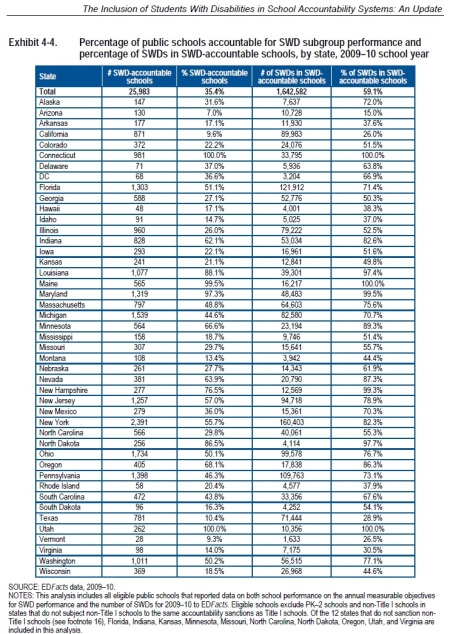(Guest Post by Matthew Ladner)
The No Child Left Behind Act required student testing and reporting of data in return for continuing receipt of federal education dollars. The law however left granular details to the states, most of whom happily went about abusing them.
This chart is from a new study about the inclusion of special needs children in state testing regimes. As you can see from the third column, states held a glorious 35.4% of schools accountable for the academic performance of special needs children during the 2009-10 school year. This ranged from a glorious 100% in Connecticut and Utah to a sickening 7% in Arizona.
I have heard through the grapevine that addressing this national scandal has been a major point of emphasis in Arne Duncan’s waiver process. As someone who views this process skeptically overall and suspects that it is creating a mess that will be difficult to unwind, let me say bully for Duncan on this score.
Those of us who have a preference for state and local control over K-12 policy need to recognize data like this and shamefully low cut scores as a major problem. I’m not an enthusiast for Washington by any means. You won’t however be hearing me sing the glories of devolving K-12 power to Arizona as long as the Wall Street stock picking chicken can pass the AIMS test on a good day and 93% percent of the schools are not held accountable for the academic progress of special needs children.


I agree that this would be a great way for Duncan to put his waiver power (assuming for the moment that we think he has such power) to constructive use. Using waivers to arbitrarily rewrite the law and favor those who pursue your preferred policies is wrong, but using them to reward states for cleaning up a mess like this is A-OK.
On the other hand, I am in favor of devolving power to Arizona even if Arizona is performing poorly, because if you only devolve power to some states and not others you’re not really devolving power at all. You have to devolve power to all 50 states or the concept of “devolving power” has lost meaning. One of the main arguments for devolving power is to create a healthy competition so that recalcitrant states like Arizona have an incentive to get off the blocks and reform themselves, but you can’t get Arizona off the blocks as long as DC is in charge.
I agree there are still plenty of reasons to support state and local over a federal approach. For instance, since the feds created an incredibly bureaucratic, adversarial and compliance uber alles special ed system, all 50 states went down the same unfortunate path at the same time.
Nevertheless, the larger problem of regulatory capture at the state and district level in K-12 education remains, and this sort of data is a real problem for devolution romantics. Governor Rick Perry for instance rather stridently made the case that Texas standards and tests were not for sale at any price.
That of course is his right, and given the huge investment in a end of course exam system Texas had made, it made all the sense in the world for Texas to stay out of Race to the Top and Common Core. A few months later however the Houston Chronicle revealed that Texas schools could get growth credit even for students getting zero answers correct on state exams. This session Texas went through the biggest dummy down in standards in history, and now we see that all of 10% of Texas schools are held accountable for the scores of special needs students.
The technical term for this is “All Hat No Cattle.”
I’m going to see what if anything I can do about the embarrasing rate here in Arizona. Personally I am not going to be satisfied with whatever Secretary Duncan wrangled out of us unless it is 100%. If Utah can do it, so can Arizona.
Nevertheless, the larger problem of regulatory capture at the state and district level in K-12 education remains…
Regulatory capture, of course, does not occur exclusively at the state and local level. 🙂
Certainly not- but if you recall the old “Democratic Party of Story, Myth and Song” post, this is also about how people want to see themselves.
If in a couple of years Secretary Duncan is able to recreate this chart and the rates for testing student with disabilities are way up, he will likely see it as an example of the federal government using its leverage in order to protect the interests of vulnerable populations against the perfidious actions of the states.
And if so, well, ummm…..
Like I said, I’m all on board for that.
Me too, but it begs the question- where does this stop? Does the next Secretary force states with frauds of a testing system to raise their cut scores? Does Secretary Bachmann grant waivers only to states embracing abstinence education, as Hess humorously posed last year?
Admittedly it’s an ambiguous distinction in particular cases. That doesn’t mean it’s not important – the courts have done a lot of mischief pretending that if lines are hard to draw then it’s somehow wrong to draw them. The deeper problem here is that since we went to direct election of senators there’s nobody in DC who has any incentive to lean against federal overreach.
Interesting that Kentucky isn’t even listed since the state identifies more than average proportions of its students as disabled per recent NAEP reports.
How many times have you guys been audited! You are right on with your comments on Duncan and the Octopus(Obama). Great analysis and comments.